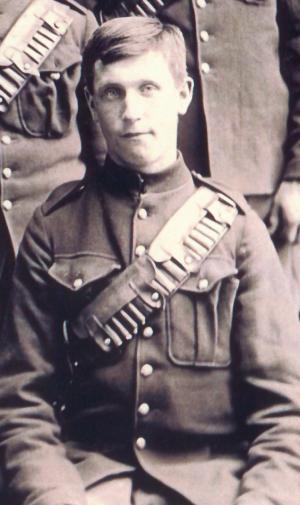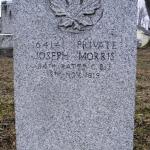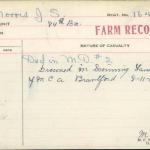Cause of Death: Drowned
Location: Brantford, Ontario
BX November 9, 1915
Private Joseph Morris, Paris, Died While in Y.M.C.A. Swimming Tank – Drowning Was Not Cause of Fatality – Acute Indigestion Given as Cause of 84th Man’s Death – Had Eaten Hearty Supper and Then Gone in for a Bathe
A cloud of gloom was cast over yesterday’s festivities in connection with the welcome of the 84th Battalion, when one of the members, Pte. Joseph Morris of Paris, a young lad of 23 years succumbed to an attack of acute indigestion while bathing the Y.M.C.A. tank.
In company with several of his fellow soldiers, Private Morris had gone into the water shortly after a hearty evening meal, and in a few moments after him companions had left the swimming pool to get dressed, the unfortunate man was found in the shallow end of the tank with the spark of life extinct. Resuscitation was tried for over an hour, but it was found that death had been caused by indigestion, and not by drowning.
As a result of the invitation extended to all, the soldiers of the battalion to make the Y.M.C.A. their rendezvous for the day and to use all the facilities of the association, the men of the 84th took advantage of the invitation to clean themselves after their week’s trek from Niagara-on-the-lake. Throughout the afternoon and early evening, the soldiers gathered in large numbers and accepted the opportunity to use the Y.M.C.A. tank.
In the evening Private Morris, in company with three or four of his companions, took his turn, they having previously enjoyed a very hearty repast at their messing headquarters on Dalhousie Street. After swimming for several moments with his fellow soldiers, Private Morris remained for a few moments alone, after his companions had gone into the dressing room.
Returning to the tank some moments later, one of the soldiers found Private Morris’ body floating in the shallow end of the tank, with the face upwards. He immediately ran to the office of the Y.M.C.A. and Harry Fleming, the assistant secretary, hurried in company with Physical Director Frank Snow, to the tank-room.
The body of the unfortunate victim was quickly taken from the water and immediately the Shafer resuscitory method was applied vigorously. Both Messrs. Fleming and Snow hold Royal lifesaving diplomas, and they in company with Dr. Cecil Chapin and Coroner Dr. Fissette, who arrived shortly afterwards, worked for over an hour in vain endeavor to revive the spark of life. At 9 o’clock, more than an hour after the body was found the task was given up and the body was removed to H.B. Beckett’s undertaking parlors.
Both Dr. Chapin and Dr. Fissette agreed the death had not been caused by drowning there having been no water taken from the body during the application of the resuscitation efforts. It is learned that Pte. Morris had a weak heart, and this in conjunction with the fact that he had eaten heartily and had gone into the water too soon after the meal is thought to explain the death. Coroner Fissette decided that an inquest was unnecessary.
Has a Brother
Private Morris has a brother, Trooper William Morris, in the active service company of the 25th Brant Dragoons, which is stationed in Paris. The two lads have no other relatives in this country so far as could be learned. Chief of Police Felker, of Paris was immediately communicated with, and Trooper Morris was informed of the death of his brother. He accompanied Chief Felker to the city last night.
Military Honors
Lieut.-Col. W.T. Stewart, officer commanding the 84th Battalion, stated this morning that Pte. Morris’ body would be buried with military honors tomorrow morning at 11 o’clock, from the undertaking parlors of H.B. Beckett, Dalhousie Street, to Greenwood cemetery. Through the efforts of Mayor Spence and William James formerly sergeant of the local police force, a lot has been secured in Greenwood cemetery, adjoining the grave of Drummer Charles Hill, a member of the Seventh Fusiliers who was drowned in the canal at South Market Street in 1867, and who was buried with military honors in Greenwood cemetery.
Ex-Sergeant James was asked to locate the grave of Drummer Hill and he was able to go directly to the spot, he having attended the funeral in person 48 years ago.
BX November 10, 1915
Honored in Death – Military Funeral – Remains of Pte. J. Morris Laid to Rest in Greenwood – Military Cortege and the Final Service were Most Impressive
With all the solemnity befitting a military funeral, the late Private Joseph Morris of Paris, member of D. Company of the 84th Battalion, who died Monday evening following an attack of acute indigestion, was laid to rest in Greenwood cemetery this morning.
Not in the history of Brantford has there ever been such a large military funeral, for the procession was nearly a mile long and took over 15 minutes to pass a given point. The funeral procession was in charge of Major Scobell, and the service was conducted by the regimental chaplain, Capt. the Rev. G.M. Barrow. The pall-bearers were from the platoon of which the deceased soldier had been a member, and the firing party was chosen from both C and D companies.
About 10:30, a squad brought the body from the undertaking establishment to the armories. Then at 11 o’clock the funeral procession was inaugurated from there. The 84th Battalion lined up both sides of the road facing inwards. Leading the sad procession was the chaplain and following him the firing party of 12 men and sergeant and corporal with reversed arms. They were followed by the band and behind the band was the corpse, carried on a gun carriage, and the pall-bearers.
The chief mourners, which included his own company, D, and his brother, Trooper William Morris of the 25th Brant Dragoons, of Paris, came next. The rest of the company followed and the local units all paraded out of respect to the deceased man. For most of the way to the cemetery, the band in solemn tones rendered the “Dead March from Saul” and the funeral procession was of a slow and stately nature.
In the rear of the long procession of soldiers were the officers and a number of prominent citizens, including W.F. Cockshutt, M.P., and J.H. Fisher, M.P., of Paris. The Y.M.C.A. was represented by the ex-president, T.L. Wood; vice-president, T.E. Ryerson; treasurer, C. Cook and the genial secretary, George L. Goodwin.
When the procession reached the cemetery the members of the battalion again lined the side of the road and faced inwards. The firing party halted close to the gate and rested with reversed arms. The body was then taken through to the side of the grave, followed by the mourners and firing party.
During the services, all removed their headdress with the exception of the firing party. Following the reading of the burial service the sergeant in command of the firing party ordered them to present arms, slope arms, and to fire the last three volleys over the grave. After the third volley had been fired, the party was ordered to fix bayonets and to present arms, while the buglers sounded the Last Post.
The body was buried in a lot in Greenwood cemetery adjoining the grave of Drummer Charles Hill, a member of the Seventh Fusiliers, who was drowned in the canal in 1867. He was then buried with military honors.
The pallbearers this morning were members of platoon number 14 “D” Company, of which deceased had been a popular member. They were in charge of Corporal Sass, as follows: Privates W. Perry, R.H. Hull, A. Hayter, S. Paddle, A. McIntyre and A. Hamacher. On the end of the coffin, which was carried on a gun carriage, drawn by local overseas artillerymen, was the dead soldier’s bayonet, belt and cap. There was a great profusion of flowers sent in, the boys of “D” sending a harp with a broken string, over six feet high, and the officers of “D” Company a broken artillery wheel.
Hundreds of local citizens lined the streets through which the funeral procession proceeded, and devoutly bowed their heads while the remains of a hero who lived not to see the battlefields of Europe, was carried to its last resting place. His spirit and deeds, however, were right, and the honors his remains received today were most fitting.



